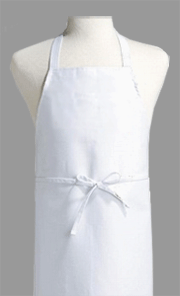 Aprons are a garment we often relegate to the 1950s, imagining housewives like June Cleaver and Donna Reed wearing frilly versions of them atop their prim day dresses. At the time, although often very pretty with fancy trims and feminine floral prints, they were also quite functional: while baking and cooking for the better part of the day, women needed something to protect their clothes from flour smudges and grease stains. They needed, in essence, to keep clean.
Aprons are a garment we often relegate to the 1950s, imagining housewives like June Cleaver and Donna Reed wearing frilly versions of them atop their prim day dresses. At the time, although often very pretty with fancy trims and feminine floral prints, they were also quite functional: while baking and cooking for the better part of the day, women needed something to protect their clothes from flour smudges and grease stains. They needed, in essence, to keep clean.
It makes sense, then, that some of the first aprons were used for the same purpose: to preserve the clothes blacksmiths, weapon makers, carpenters, cobblers, tailors, jewelers, and the like wore underneath of them. They were simple smocks that allowed men in trades to do their work without worrying about the wear and tear they would inevitably put on their clothing without a protective covering. Aprons used for this sort of hard labor were made of appropriately sturdy material that could withstand exertion, like leather, duck cloth, and canvas.
It wasn’t until the turn of the 20th century that aprons became associated with those that we often identify them with: women. In Victorian England, many matrons would sport aprons that were daintily embroidered – even though married middle class women often had servants to help with housework. They became understood as a symbol of domesticity.
At times, throughout the 1900s, this domestic association was embraced, as seen in the 1950s when the housewife was a celebrated position for women to adopt. There were other eras, however, when what aprons represented – staying at home – was inevitably abandoned. During the 1920s, for instance, when middle class women were seeking liberation and the right to vote, many of them rejected donning aprons for the purpose of cultivating a home-loving appearance, using them only when absolutely practical, but saving them mostly to be used by the servants and kitchen hands who actually needed them in their day-to-day work.
Today aprons are mostly associated with chefs and those who operate in kitchens, but they have uses that extend far beyond the cooking industry. Though at Lord Baltimore Uniform, many of our clients who rent aprons and butcher frocks work in food service, we also expect the original use of aprons to make a comeback: that is, to protect individuals who work in trades from getting their work uniforms messy. Whether you’re a landscaper, plumber, electrician, or otherwise, we recommend considering apron rental to keep you looking polished as you go from assignment to assignment, removing your work bib to meet new clients and then putting it back on to get the job done – without having to be concerned about keeping your clothes clean.
At Lord Baltimore Uniform, we will label and launder your aprons and other rental textiles so that you can remain looking presentable without having to worry about the hassle of cleaning your uniform. To learn more about our Apron Rentals, please contact Joe Bateman at Lord Baltimore Uniform & Linen Rental by calling 1-800-292-1224, or visit our website for more information about our products and services.
Connect with us on Google+, Facebook, LinkedIn, Pinterest, and Twitter.
Sources:

